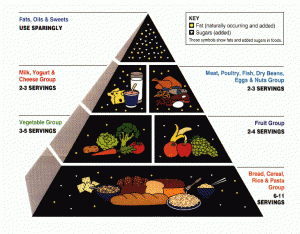“One size fits all” approaches such as using the food pyramid to illustrate the ideal quantity and types of food have been ineffective and, instead, resulted in what the Center for Disease Control and Prevention (CDC) calls an “obesity epidemic.”

Over the years and despite their best intentions, nutrition specialists have largely failed to help children and adults develop healthier eating habits, including consuming less red meat and reducing salt. “One size fits all” approaches such as using the food pyramid to illustrate the ideal quantity and types of food have been ineffective and, instead, resulted in what the Center for Disease Control and Prevention (CDC) calls an “obesity epidemic.”
In a recent European study entitled “Food4Me”, 1,607 adults across seven countries were randomized to one of four treatment groups. In addition to a control group which was given conventional dietary advice, the other three groups were given three different and personalized nutrition options, including:
- Personalized nutrition based on analysis of their current diet
- Personalized nutrition based on their diet and phenotype (body fatness and blood markers)
- Personalized nutrition based on diet, phonotype and genotype (where five genes were examined)
At the conclusion of six months, 80 percent of the participants completed the study and researchers discovered that those who received personalized nutrition information had significantly greater improvements in their eating patterns than those in the control group.
When asked her opinion on this study, the founder of EVEXIAS Medical Centers, Terri DeNeui was not surprised. “There’s no question that the ‘one size fits all’ approach does not work in weight loss or nutrition counseling. We all have an individual blueprint via our DNA. That is why the Evexias weight loss program is based on science and our counseling is individualized based on many factors, including genetics.”
Are you ready for a personalized approach to weight-loss? Click here and let us show you how effective this can be.
Evidence Based Medicine = Healthier Outcomes
If, as this study suggests, more individualized advice will lead to healthier outcomes, the challenge lies in the formulation of this “advice,” especially since every individual has a unique set of genes and lifestyle. Nurse practitioner DeNeui explains how EVEXIAS Medical Centers approaches this.
“We are finding that the food pyramid, which emphasizes the consumption of grains, is not a good guide for many people because of issues with eating grains,” she said. “Many people become bloated, their stomach hurts, and they have indigestion issues – and that’s what the food pyramid suggests for healthy nutrition!
“Unfortunately, many people ignore the foods that disagree with them. Years ago when I was trying to lose weight, every time I tried a fad diet and ignored what I knew my body did well with, I would feel miserable and not lose weight. I finally came across a DNA test that clarified the types of foods I should consume to realize a healthy weight.”
The PathwayFit Test
EVEXIAS Medical Centers, offers patients a state-of-the-art DNA test called The PathwayFit test which informs a personalized nutrition and exercise program. DeNeui explains how and why this test is changing personalized treatment for weight loss.
“We are in the nascent stages of learning what DNA testing can tell us. For some time, we have used this type of testing to learn such things as which medications can help or hurt an individual. Now, we are finding DNA markers that can help us determine which types of diets and exercises can help people lose weight.
“DNA markers help us understand how an individual metabolizes elements such as B vitamins, omegas and certain nutrients from the diet. With this knowledge, we know that if the body does not extract these elements well, they should be supplemented.
“While everyone is different, in my case the PathwayFit test showed that my body responds better to a Mediterranean type diet,” DeNeui noted. “This was great news to me because I love fresh vegetables, fish, lean meat, wine and olive oils that are an important part of this diet! It also showed that my body responded better to vigorous cardio-vascular exercise rather than weight-training. “
“The PathwayFit test is a simple blood test which leads to a 30-page report,” she chuckled. “Part of this voluminous report includes such things as menu and recipe suggestions for different foods. This is very valuable because even if we know what type of diet works best for our DNA, we often have no clue in how to execute on this information.
“The company that developed this test, Pathway Genomics, has also developed a cardiac DNA profile that shows the part LDL and HDL play in an individual’s weight loss program. We can offer a “combo” package which deals with both the cardio and the metabolic health factors such as one’s cholesterol, omegas and risk for heart attack,” she said.
The Role of Hormonal Health in Weight Loss
Terri DeNeui and her clinical team are recognized for their expertise in hormonal health. Balanced hormones can help patients lose weight and keep it off. She explains.
“While we are not quite there yet, I am looking forward to the day when there is more DNA testing to inform specifics on hormones and their effect on weight loss,” she said. “What we know today, however, is that we do need our hormones balanced in order for a weight loss lifestyle to work.”
“It’s important to note that the information about nutrition and exercise gleaned from DNA testing works hand-in-hand with hormone balancing. When a patient is eating correctly and exercising appropriately, some hormones, such as cortisol and insulin, begin to balance on their own.
“With regard to sex hormones – testosterone, estrogen and progesterone – it is imperative that those hormones are balanced and brought back to an optimal level before any weight loss program is started. This is because hormones are the keys to all of our metabolic processes.”







